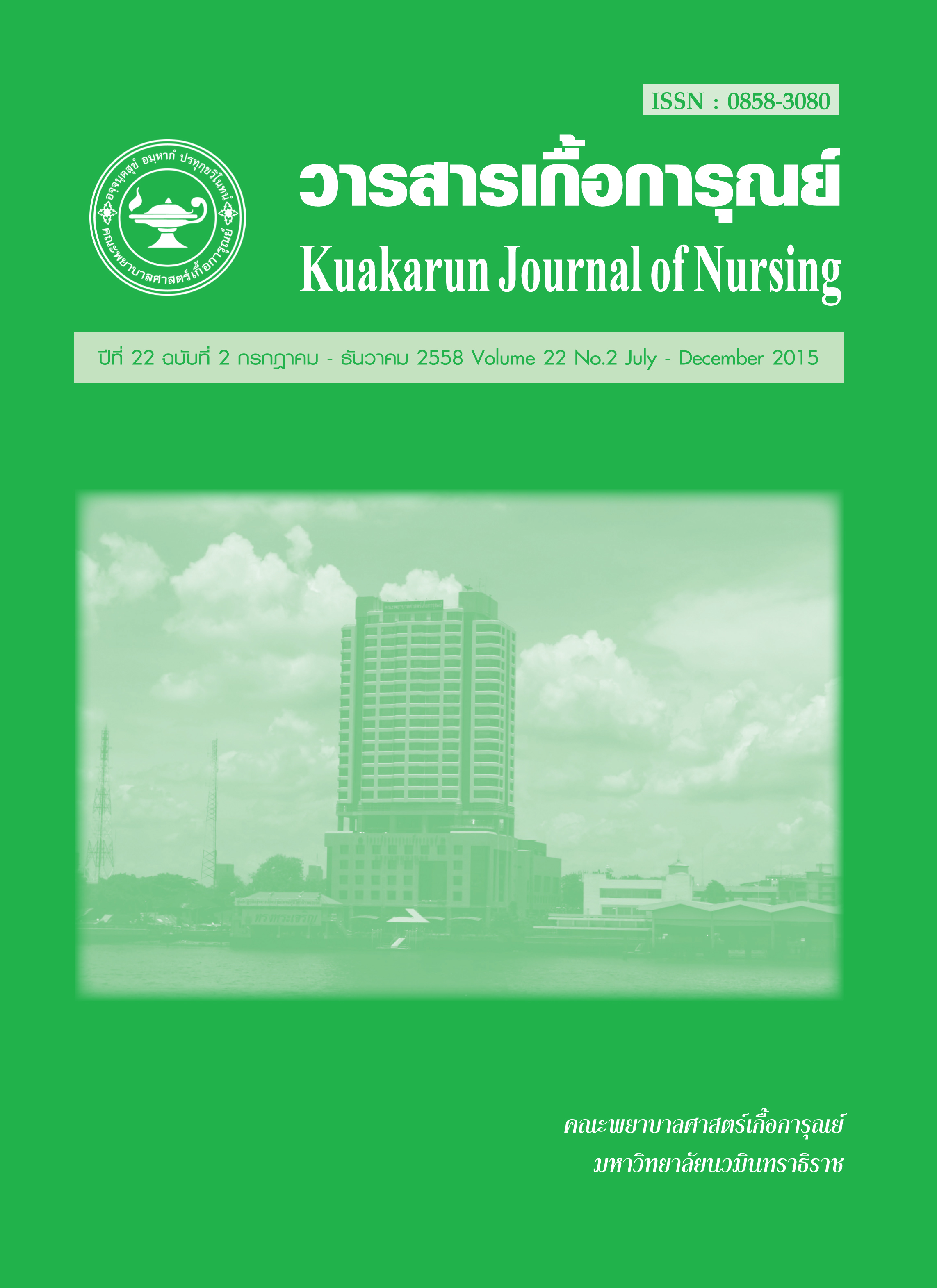ความสัมพันธ์ระหว่างการปฏิบัติตนด้านสุขวิทยาเกี่ยวกับการนอน ความเหนื่อยล้า ความปวดภาวะซึมเศร้า และคุณภาพการนอน หลับของผู้ป่วยบาดเจ็บสมอง* Relationships among Sleep Hygiene Practices, Fatigue, Pain, Depression, and Sleep Quality in Patients with Brain Injur
คำสำคัญ:
ผู้ป่วยบาดเจ็บสมอง, คุณภาพการนอนหลับ, ความเหนื่อยล้า, ความปวด, ภาวะซึมเศร้าบทคัดย่อ
การวิจัยครั้งนี้เป็นการวิจัยเชิงบรรยาย เพื่อศึกษาความสัมพันธ์ระหว่างการปฏิบัติตนด้าน สุขวิทยาเกี่ยวกับการนอน ความเหนื่อยล้า ความปวด ภาวะซึมเศร้า และคุณภาพการนอนหลับ ของผู้ป่วยบาดเจ็บสมองกลุ่มตัวอย่างคือ ผู้ป่วยบาดเจ็บสมองที่เข้ารับการรักษาในแผนกผู้ป่วยนอกโรงพยาบาลจุฬาลงกรณ์ สภากาชาดไทย และโรงพยาบาลตำรวจ จำนวน 110 คน เลือกกลุ่มตัวอย่างโดยวิธีการสุ่มอย่างง่าย เก็บรวบรวมข้อมูลโดยใช้ แบบบันทึกข้อมูลส่วนบุคคลและ การเจ็บป่วยแบบประเมินคุณภาพการนอนหลับ แบบประเมินพฤติกรรมการปฏิบัติตนด้านสุขวิทยาเกี่ยวกับการนอนหลับ แบบประเมินความเหนื่อยล้าแบบประเมินอาการปวด และแบบประเมินภาวะซึมเศร้า วิเคราะห์ข้อมูลด้วยสถิติบรรยายและค่าสัมประสิทธ์สหสัมพันธ์ของเพียร์สัน ผลการวิจัยพบว่าคุณภาพการนอนหลับของผู้ป่วยบาดเจ็บสมองอยู่ในระดับดี X = 99.58, SD = 23.44) พฤติกรรมการปฏิบัติตนด้านสุขวิทยาเกี่ยวกับการนอนมีความสัมพันธ์ทางบวก
กับคุณภาพการนอนหลับของผู้ป่วยบาดเจ็บสมองอย่างมีนัยสำคัญทางสถิติที่ระดับ .05 (r = .20)
ความเหนื่อยล้า ความปวด และภาวะซึมเศร้ามีความสัมพันธ์ทางลบกับคุณภาพการนอนหลับ
ของผู้ป่วยบาดเจ็บสมองอย่างมีนัยสำคัญทางสถิติที่ระดับ .05 (r = -.50, -.41, -.50 ตามลำดับ)
Relationships among Sleep Hygiene Practices, Fatigue, Pain, Depression, and Sleep Quality in Patients with Brain Injury.
The purpose of this research was to study the relationships among sleep
hygiene practices, fatigue, pain, depression and sleep quality in patients with
brain injury. One hundred and ten of brain injury patients were recruited using
simple sampling technique from In-Patients Department of King Chulalongkorn
Hospital, and Police General Hospital. The instruments used for data collection
were the demographic data and the illness data form, the Verran and Snyder-
Halpern Sleep Scale (VSH), the sleep hygiene practices questionnaire, the Piper
fatigue scale, the pain questionnaire, and the Center for Epidemiologic Studies-
Depression Scale (CES-D). Data were analyzed by using means, standard deviation, and Pearson’s product-moment correlation. The findings revealed that patients with brain injury had a good level of sleep
quality (X = 99.58, SD = 23.44). Sleep hygiene practices was positively significantly correlated with sleep quality in brain injury patients (r = .20, p < .05). On the other hand, fatigue, pain, and depression were negatively significantly correlated with sleep quality in brain injury patients (r = -.50, -.41, -.50, p < .05)

















